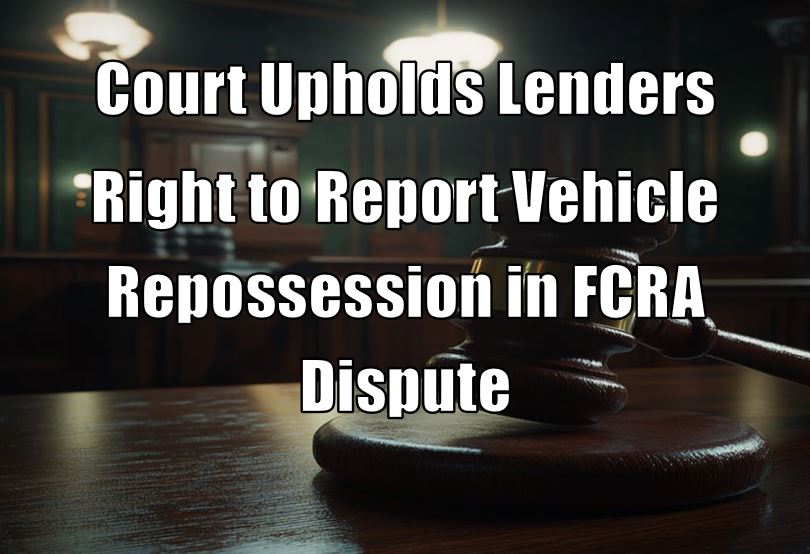For collectors and lenders, this ruling underscores the importance of maintaining clear loan documentation and promptly addressing borrower disputes.
–
When Sharlene Jacobs left for her month’s long world tour, she left her car at home and took an Uber to the airport. Unfortunately, she left her car illegally parked and it was towed away. With a lien sale pending, despite the payments being current, her lender had no choice but to repossess. Jacobs sued; not for the repossession, but for the lender reporting it to her credit.
In a significant win for lenders, a federal court in the Southern District of Florida ruled in favor of Capital One Bank, N.A., in a Fair Credit Reporting Act (FCRA) lawsuit filed by borrower Sharlene Jacobs. The decision, handed down on August 1, 2024, in *Jacobs v. Capital One Bank, N.A.*, reinforces the importance of accurate reporting and reasonable dispute investigations for creditors and collectors.
The case stemmed from the repossession of Jacobs’ vehicle after she defaulted on her auto loan with Capital One Auto Finance. The repossession was reported to credit bureaus, impacting her credit score. Upon returning to find the vehicle repossessed, Jacobs ceased making loan payments.
Jacobs claimed the reporting was inaccurate and that Capital One failed to properly investigate her disputes, violating the FCRA. She argued the negative credit entry caused financial hardship, including challenges securing housing and employment.
Capital One countered that the repossession was lawful, based on Jacobs’ failure to meet loan terms, and that its reporting was accurate. The bank also demonstrated it conducted reasonable investigations into Jacobs’ disputes, as required under the FCRA.
U.S. District Judge Aileen M. Cannon agreed, granting summary judgment to Capital One. The court found no evidence of inaccurate reporting or inadequate investigation, affirming that creditors are not liable under the FCRA when their actions align with loan agreements and reporting obligations.
Also named in the lawsuit was credit reporting agency Equifax. Since Capital One was granted a summary judgment for the information provided to Equifax, Equifax was found likewise not liable for reporting the very same information.
For collectors and lenders, this ruling underscores the importance of maintaining clear loan documentation and promptly addressing borrower disputes. It confirms that accurate repossession reporting, backed by evidence of default, will withstand FCRA challenges.
To minimize legal risks, creditors should ensure compliance with loan terms, provide clear communication to borrowers, and conduct thorough investigations into disputed credit reports. This decision strengthens the position of lenders who follow these practices, protecting their ability to report valid repossessions without fear of unwarranted liability.
Source: Justia
Court Upholds Lenders Right to Report Vehicle Repossession in FCRA Dispute – Court Upholds Lenders Right to Report Vehicle Repossession in FCRA Dispute – Court Upholds Lenders Right to Report Vehicle Repossession in FCRA Dispute
Court Upholds Lenders Right to Report Vehicle Repossession in FCRA Dispute – Repossession – Repossess – Repossession – Delinquency – Equifax – Lending – Auto Loan –












More Stories
From Dealership Desks to Racketeering: Another Miami Fraud Ring Busted
CarMax Settles with DOJ Over Illegal Repossessions
Talk Derby to Me at the NWCUCA 51st Annual Conference